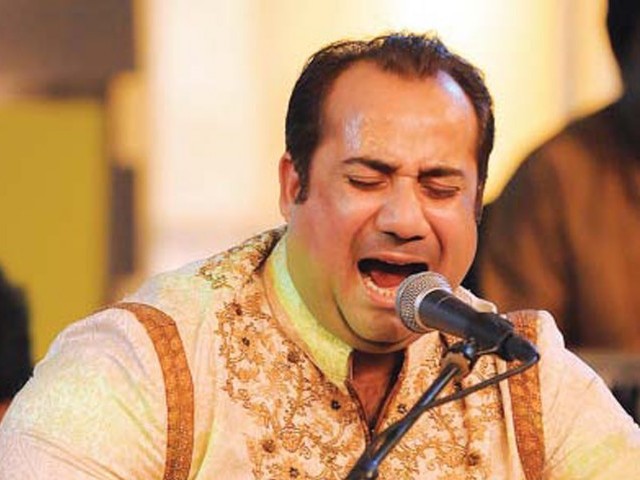


It is almost 11.30 p.m. when I reach Al Nojom Ballroom in Hotel Shangrila. There Rahat Fateh Ali Khan is just in the process of concluding the first session of his exclusive concert for Club Encore. For a while, I just stand admiring his booming bass voice exuding power and passion- so much like his legendary uncle and mentor the late Ustad Nusrat Fateh Ali Khan. The elite audience for the evening is in frenzy, clapping and singing with him. Finally the session is over and people start dispersing for dinner. Showing almost no signs of fatigue, Rahat readily agrees to sit down for an interview. But before we actually get down to business, he smilingly obliges a TV crew waiting for snippets and also exchanges pleasantries with quite a few admirers waiting to express their admiration.
At close quarters, he seems even younger than his 31 years. Apart from his baby-face and short, stout frame, another thing that strikes you is his speaking voice. Soft and tender, it contrasts so much with his robust, high-pitched singing voice. At first, he seems a bit too formal and reserved but soon he opens out to share his intimate experiences from his remarkable musical journey that has already taken the music-world by storm. Here are the excerpts of the interview.
How did your musical journey begin?
Our family has a 600 years old musical tradition and I too, just followed in my ancestors’ footsteps. From the age of five, my uncle (the late Nusrat Fateh Ali Khan) took me under his wings and started teaching me the nuances of classical and Sufi spiritual music. He had a nice, loving way of teaching and was very sweet and accommodating.
I still remember my first solo performance. It was at the age of ten. I sang at the music festival commemorating the death anniversary of my grandfather. It is a prestigious annual event in Pakistan where great artists like Mehdi Hassan, Ghulam Ali and Noor Jahan have performed. There I sang some classical compositions and received a big round of applause. That experience gave me a lot of confidence.
Later on, from the age of fifteen, I started accompanying my uncle in all his programs and more than any formal training, those concerts really taught me a lot about intricacies of singing.
Considering your robust style of rendition, was it bothersome when your voice was in adolescent transitional phase?
Yes, it was a difficult phase. As a child, I had this sweet and soft voice but then it started changing and becoming hoarse and coarse during adolescence. For a while, I was afraid that I won’t ever be able to sing properly again but Nusrat sahib just told me- ‘Keep singing and everything will be fine.’ His encouragement saw me through that period.
Nusrat sahib changed the centuries-old grammar of Sufi music by incorporating modern instrumentation. Wasn’t there a criticism from the purists for his musical approach?
Sometimes to succeed, one has to employ measures which might seem drastically different from the traditional norms. What my uncle did was bold and daring and that’s why he could separate himself from others. He was open to all musical influences and a pioneer in the world music- a genre that has now millions of admirers.
How did Mann Ki Lagan happen?
Nusrat sahib had composed the first line of this song almost 7-8 years ago and for many years, I was toying up with an idea to complete the song. Finally my father helped me out in completing the song. First, we had planned to release it in a private album in 2000 but that project fizzled out. Then, through a common friend, I met Pooja Bhatt’s husband Mahesh ‘Munna’ who liked the song so much that he included in the film Paap.
How is the Bollywood experience so far?
I enjoy singing for Bollywood films. In fact, from childhood I have been a big fan of Hindi film songs and I used to sing them regularly at house-parties. I am an ardent admirer of Lataji. I am fascinated by her ability to make even difficult tunes sound so simple. I also enjoy listening to songs of Asha Bhosle and R.D.Burman.
How difficult has it been to come out of your uncle’s shadow and to establish your own identity?
Ustad Nusrat Fateh Ali Khan was a genius that one gets to see only once in lifetime and I have been extremely fortunate to have had him as my mentor. I still remember the day I heard that he was no more. That time, I was in Pakistan and he was in a London hospital. It was 16th August 1997- just after people of India and Pakistan had celebrated their independence days. It turned out to be the longest and darkest day in my life.
I have practically imbibed Nusrat sahib’s music and keep learning new things just by repeatedly listening to his songs. I am not ashamed of admitting his influence and will be carrying on that style proudly till my last day.
Yet, this influence does tend to bother a little. It is like a small sapling trying to grow under the shadow of a giant tree. It needs all the tender loving care to keep growing. God has been kind that I have been able to carve my small niche.
What are your new projects?
I am working on many of Nusrat sahib’s unused tunes and also, making my own compositions. God willing, you will be listening to them in near future.